 Petzlover
Petzlover Shih Tzu is originated from China but Toy Australian Shepherd is originated from United States. Shih Tzu may grow 8 cm / 3 inches shorter than Toy Australian Shepherd. Both Shih Tzu and Toy Australian Shepherd are having almost same weight. Shih Tzu may live 5 years more than Toy Australian Shepherd. Both Shih Tzu and Toy Australian Shepherd has almost same litter size. Shih Tzu requires High Maintenance. But Toy Australian Shepherd requires Moderate Maintenance
Shih Tzu is originated from China but Toy Australian Shepherd is originated from United States. Shih Tzu may grow 8 cm / 3 inches shorter than Toy Australian Shepherd. Both Shih Tzu and Toy Australian Shepherd are having almost same weight. Shih Tzu may live 5 years more than Toy Australian Shepherd. Both Shih Tzu and Toy Australian Shepherd has almost same litter size. Shih Tzu requires High Maintenance. But Toy Australian Shepherd requires Moderate Maintenance
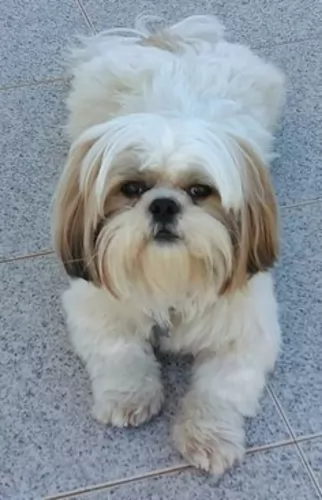 The Shih Tzu is an Imperial Chinese breed developed by palace breeders hundreds of years ago with breed stock from the Tibetan lines. It is quite probable that the Shih Tzu was originally a cross between two Sino-Tibetan ancient dogs – the Pekingese and the Lhasa Apso. Based on their looks, the Shih Tzu means the lion dog, but they were really very pampered palace dogs living with the Chinese emperors and families. The emperors were always gifting the breeders who developed the most affectionate, gentle and beautiful Shih Tzus.
The Shih Tzu is an Imperial Chinese breed developed by palace breeders hundreds of years ago with breed stock from the Tibetan lines. It is quite probable that the Shih Tzu was originally a cross between two Sino-Tibetan ancient dogs – the Pekingese and the Lhasa Apso. Based on their looks, the Shih Tzu means the lion dog, but they were really very pampered palace dogs living with the Chinese emperors and families. The emperors were always gifting the breeders who developed the most affectionate, gentle and beautiful Shih Tzus.
Until the 1930’s the Shih Tzu was not known to the world outside the emperor’s palace. Once the breed did come out from behind the palace walls, they were immediately popular. Much debate went on about how to refine the breed as clubs began to spring up in Peking and then in England. It was not until 1969 the Shih Tzu was recognized and entered in the AKC Stud Book.
While the original Shih Tzu might have been a mix between the Pekingese and the Lhasa Apso, today’s breed spread around the world after the second world war. In Europe in the 1930’s the breed was classified as Apsos. In 1935 the first Shih Tzu Club of Europe was formed, and the first standard was written, and the breed was categorized as the Shih Tzu.
Following World War II, soldiers brought the dogs to the States from Europe. By the 1950’s the breed was growing in popularity and the AKC recognized the breed in 1969 as members of the Toy Group. They are now recognized by all major kennel clubs throughout the western world. They are recognized by the Federation Cynoloqique Internationale in the Companion and Toy Group, among Tibetan breeds.
The Shih Tzu is a good watchdog, but it was bred to be a companion animal. It is a friendly, open breed that welcomes strangers. They are great with other animals and children as well as adults.
 These beautiful little dogs interestingly don’t originate in Australia. They were originally bred in the western U.S. as herding dogs.
These beautiful little dogs interestingly don’t originate in Australia. They were originally bred in the western U.S. as herding dogs.
Today they are mainly companion dogs. Their lineage goes back to a pair of sibling dogs - the Wildhagen Dutchman and Fieldmaster of Flintridge and these two dogs began the lineage to which the Miniature Australian Shepherd belongs.
Known also as ‘Aussie’, there are different stories to its exact origins. It is thought that some Basque farmers brought dogs with them when they came to Australia, taking them to the United States during the 1849 California gold rush.
The dog has been crossed with a number of breeds to bring about a dog that could cope with harsh temperatures.
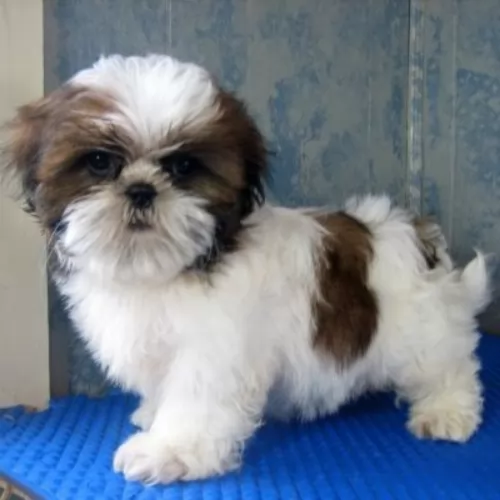 This is a breed of lively, sturdy and alert little dogs with a beautiful double coat that is flowing and long. In its full glory the Shih Tzu coat is touching the floor all the way around the dog. The dog’s bearing is as royal as its history, arrogantly carrying his head high and his tail curving over his back.
This is a breed of lively, sturdy and alert little dogs with a beautiful double coat that is flowing and long. In its full glory the Shih Tzu coat is touching the floor all the way around the dog. The dog’s bearing is as royal as its history, arrogantly carrying his head high and his tail curving over his back.
The Shih Tzu is a solid, compact breed with weight and substance. They may be a small dog, but they are a strong one. They have large dark eyes with a short muzzle and fur covered drop ears. They are just a little longer than they are tall with a distinct underbite.
There are a few differences between the European or UK Kennel Club standard and the American Kennel Club AKC standard. As opposed to the UK standard the AKC standard states that:
• The hindquarters are muscular while the front are straight. They are balanced in that they are not too long or too short.
 The Toy Australian Shepherd, also referred to as the Mini- or Miniature Australian Shepherd is a small dog standing at between 26 - 36 cm in height and weighing between 3 to 9kg.
The Toy Australian Shepherd, also referred to as the Mini- or Miniature Australian Shepherd is a small dog standing at between 26 - 36 cm in height and weighing between 3 to 9kg.
He has a medium-length, weather-resistant coat which is white with tan, black, red or blue merle. The coat is long, and slightly wavy with feathering around the legs and neck.
They eyes can be blue or brown or he can have two differently colored eyes.The tail of these dogs can be a natural bobtail or it is docked. They do shed but they don’t require that much grooming.
These playful little dogs may be small, but they are brave and full of courage. They’re also easy going, and love nothing more than to be around their human family.
They love the games that children play and are always ready to join in, making excellent playmates for children. Lively and alert, they also make good watchdogs and because they are so intelligent, they are easy to train and socialize.
Their intelligence means they need to be physically and mentally stimulated otherwise they can become destructive from sheer boredom. They’re full of energy and will require regular exercise every day.
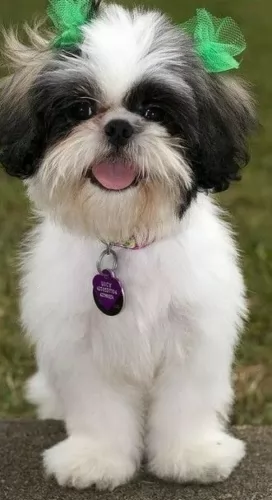 2.Special talents – they were bred to be companion animals. They are friendly and loyal.
2.Special talents – they were bred to be companion animals. They are friendly and loyal.
3.Adaptability Yes very much so. They can live in an apartment or on a farm. It doesn’t matter and they don’t need a yard.
 The Toy Australian Shepherd is such a clever little dog and eager to learn too. You won’t have trouble getting him trained and socialized as he is eager to learn.
The Toy Australian Shepherd is such a clever little dog and eager to learn too. You won’t have trouble getting him trained and socialized as he is eager to learn.
He bonds closely with his human family, becoming a loyal, devoted pet. They are also great playmates for children. They’re the kind of dogs that will require mental and physical stimulation if they are to to be prevented from becoming bored and frustrated.
They need social interaction with their human family and will be devastated if they were to be stuck in the backyard and all but forgotten.
They have a lifespan of 12 – 14 years and you want to make sure they’re happy, contented years, because he is wiling to play his part and make you a wonderful pet and companion.
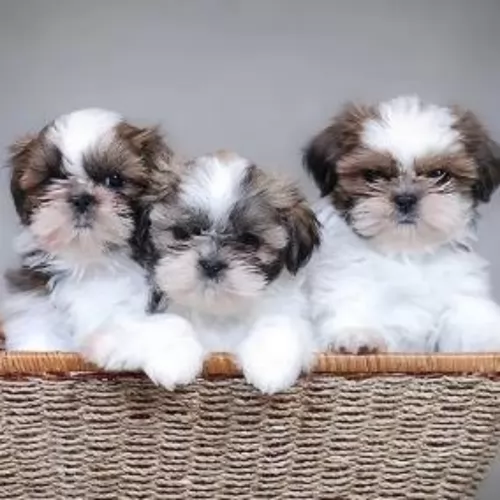 For many breeds that have the advantage of isolation like the Shih Tzu did with the emperors of China usually have very little genetic health issues. Most of the breed is indeed healthy but there are some issues.
For many breeds that have the advantage of isolation like the Shih Tzu did with the emperors of China usually have very little genetic health issues. Most of the breed is indeed healthy but there are some issues.
• Brachycephalic airway obstructive syndrome due to the shape of their face and head causes them to have breathing issues. They cannot handle heat and they cannot swim. They can have an upper airway obstruction that makes it hard for them to breath. If this is bad enough, surgery may be required.
• Hypothyroidism – thyroid does not produce the hormones necessary for metabolism to work effectively. This can lead to weight gain, hair loss, lethargy and muscle loss. It can be treated effectively.
• Issues of the eyes include – cataracts, corneal dryness and inflammation, progressive retinal atrophy, improperly closing eyelids and retinal detachment.
 Make sure your Toy Australian Shepherd sees the vet as a puppy to be dewormed and to get his first puppy injections.
Make sure your Toy Australian Shepherd sees the vet as a puppy to be dewormed and to get his first puppy injections.
Dental disease is far more serious than you think. It can affect other areas of your dog’s body. Plaque and inflamed gums lead to bone- and tooth loss.
Bad breath is a sign of periodontal disease. Find out from your vet what to do to guard against periodontitis. It’s important because ignoring bad teeth can lead to heart disease, with bacteria constantly entering the blood stream.
Fleas and ticks are your pet’s enemy as well as heartworm. Dogs can die from heartworm infestations. Heartworm is linked to mosquito bites, so if you live in warm areas, check with your vet for preventative measures.
This is another common dog illness to watch out for. This is a painful condition where the hip joint isn’t formed properly and it can lead to terrible pain and lameness.
Just like people endure endless misery with eczema, dogs too can develop skin allergies. They can create endless frustration and misery for any pet because of the terrible itch and pain. All the licking and scratching can lead to secondary bacterial infections too.
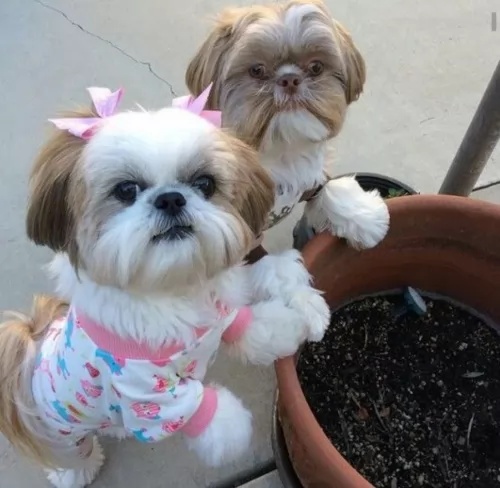 1.Feeding the puppy – this is a toy dog so don’t overfeed. They have a tendency to become obese. Calorie and weight level need to be calculated with any diet you feed. The diet should be high quality with plenty of protein made for toy dogs. Feed the puppy at least 3 times a day, maybe four in very small amounts, never more than ½ cup per day.
1.Feeding the puppy – this is a toy dog so don’t overfeed. They have a tendency to become obese. Calorie and weight level need to be calculated with any diet you feed. The diet should be high quality with plenty of protein made for toy dogs. Feed the puppy at least 3 times a day, maybe four in very small amounts, never more than ½ cup per day.
2.Feeding the adult - this is a toy dog so don’t overfeed. They have a tendency to become obese. Calorie and weight level need to be calculated with any diet you feed. The diet should be high quality with plenty of protein made for toy dogs. Feed the adult once or twice a day in larger amounts than the puppy but never more than ¾ of a cup per day.
3.Points for Good Health - most Shih Tzu’s are hardy with exceptionally good health.
This is a pampered, not high energy dog. However, she still needs playtime, which can be indoors and short walks outdoors every day.
 Your puppy will need 4 small bowls of food a day. If you’re wondering just how much, either speak to your vet or follow the portion-guide on the packaging of the puppy dog food.
Your puppy will need 4 small bowls of food a day. If you’re wondering just how much, either speak to your vet or follow the portion-guide on the packaging of the puppy dog food.
As your puppy grows older, you feed less frequently so that he is getting two meals a day as an adult. For feeding an adult, there are excellent commercial dog foods available - remember to choose a good brand for your dogs age, size and energy levels.
Try and give him some tasty home-made food too from time to time – nothing exotic and spicy – just plain foods such as boiled chicken, brown rice, spinach, sweet potatoes and carrots. Dogs thrive on simple, healthy food like this. Make sure he always has a bowl of cool, fresh water to drink.
These energetic little bundles of fur will need regular exercise – every day in fact. He’s a smart little dog too, so you need to provide him with stimulating games that will keep his mind and his body physically fit.
Reduce shedding and loose hair by brushing the long hair a least twice a week. This will also help to get rid of matting. Trim nails and check for fleas and ticks.
Provide your Toy Australian with a warm, dry, peaceful place to sleep. If he is outside often, make sure he has both sun and shade to lie in as well as a sheltered spot for when it rains.